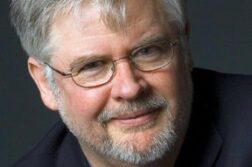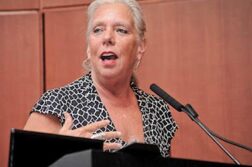I WRITE in two capacities: first, as someone who counted Michael Hattersley among my very closest of friends, and second, as the editor of this magazine, to which Michael was a frequent contributor over a fifteen-year period. The two roles were inevitably intertwined. But lest anyone think that the wheels to publication in the GLR were somehow greased by our personal friendship, let me say simply that Michael was one of the most brilliant people I have ever known, and it was a huge privilege for me to publish his essays and book reviews over the years.
As a friend, it was all about the Conversation. Michael could talk about almost any topic, and did. I too pride myself on this ability, but in Michael’s case it wasn’t just a matter of dilettantism; he had real depth in a number of fields. GLBT rights was only one of them, but even here the range of his interests was breathtaking. To give you a sense of this, let me just enumerate the feature articles that he wrote for the GLR from 1996 to 2008: “Rock’s Role in Gay Liberation”; an interview with Camille Paglia in 1998 that delved deeply into her book Sexual Personae; “The Gayness of King Alexander [the Great]”; “The Queere Kingship of James I”; “The Late, Great Planet Bigotry,” a hopeful piece written on the eve of the stolen election of 2000; “Prospects for Progress in Arab Lands,” written soon after 9/11, 2001; “Will Success Spoil Gay Culture?”; “Did Oscar Wilde Set Back Gay Rights?”; and “A Presidential Election for the Ages,” written on the eve of the 2008 election. He also wrote quite a few book reviews, touching on Larry Kramer’s legacy, Allen Ginsberg’s poetry, Oscar Wilde’s “secret life,” and a land called Provincetown.
I should note that Michael’s own book, Socrates and Jesus: The Argument that Shaped Western Civilization, was reviewed (favorably) in last year’s July-August issue. And not to be forgotten: the very first thing I published by Michael was a poem entitled “The Angel in the Streets,” which appeared in the Spring 1995 issue. Oh, Michael was also an accomplished poet whose book of poems, Cape Cod Light, came out in 1998.
All of these topics were grist for the Conversation, which stretched over a 25-year period starting in 1986 (when we met at the Paradise Café in Cambridge). Most of the talk took place in one of two venues, generically speaking. The first was Herring Cove Beach in Provincetown, where we would meet at 11 AM whenever I was in town from May to September—or “we,” I and my partner Stephen, starting in 1999. Beginning in the mid-90’s, our usual meeting place was on the beach just past the bluff where “the flats” begins. In more recent years, we would pitch our umbrellas at an ever diminishing distance from the parking lot, eventually settling on an area just past the lesbian section.
The other meeting place was the bar, often at the corresponding hour of 11 PM. Eventually, it was all about the Porch Bar of the Gifford House, where Michael would hold court at the one outdoor table, to which he would attract a suitable complement of friends and strangers to occupy the table’s eight sides. But that tradition became the rule only after smoking was banned in Massachusetts bars about eight years ago. Before that, it was often in the Little Bar next to the A-House where we would meet, typically adjourning to the disco as the evening wore on, perchance to dance.
The talk itself usually took the form of a debate, and there were a number of recurring themes that went on for years: whether homo sapiens had ever interbred with Neanderthals; whether Socrates was Plato’s master or mostly a literary device; whether cats are as smart as dogs (Michael actually thought this was possible); whether sex without affection is ever justified; whether religion is at root a source of meaning or a force of social control; whether humanity has destroyed the planet irrevocably, or not. The latter discussion would usually start or end with me declaring: “we’re doomed.” Here, as in most cases, Michael would stake out the more optimistic, and certainly the more level-headed, position.
That rule held especially in our endless discussions about the politics of the day. We disagreed just enough to make the conversation interesting. Both of us would identify with what might be called the sane left, but we arrived there from different places—I had flings with both Marxism and libertarianism in my youth—so Michael could be counted on to be the voice of sweet reason, and hope. He loved and trusted Barack Obama, and I’m very glad he lived to witness Obama’s election and an end to the dark years of George W. Bush.
And then there were the top ten lists, which we would dream up on the fly: the greatest rock groups of all time; the best American playwrights of the last century; the greatest composers; the greatest novels in the English language; and on and on. It was fun; it allowed us to stand astride Western civilization and judge the quick and the dead; but mostly it was a platform for launching more debates. (What, you’re placing Bob Dylan ahead of Joni Mitchell?)
One thing we agreed on—one of many—was that the greatest poet of the 20th century was William Butler Yeats. Let me end with the words that Yeats wrote as his own epitaph, because I think they also capture Michael’s outlook: his fatalism, his wholly unsentimental view of life as an arbitrary moment in time—a great privilege to be sure, an opportunity to learn and learn; but don’t get too attached to these borrowed atoms that must be returned, whether sooner or later. Wrote Yeats: “Cast a cold eye on life, on death. Horseman, pass by!”




